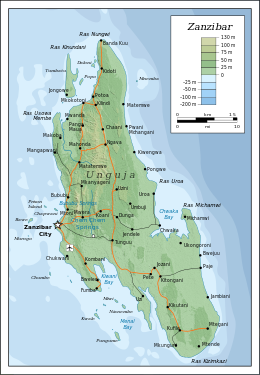Unguja
Tanzanian island of the Zanzibar Archipelago From Wikipedia, the free encyclopedia
Tanzanian island of the Zanzibar Archipelago From Wikipedia, the free encyclopedia
Unguja (also referred to as "Zanzibar Island" or simply "Zanzibar", in Ancient Greek: Μενουθιάς, romanized: Menuthias – as mentioned in The Periplus of the Erythraean Sea) is the largest and most populated island of the Zanzibar archipelago, in Tanzania.
Nickname: Zanzibar Island | |
|---|---|
 Unguja | |
| Geography | |
| Coordinates | 6°08′S 39°20′E |
| Archipelago | Zanzibar Archipelago |
| Area | 1,666 km2 (643 sq mi) |
| Length | 85 km (52.8 mi) |
| Width | 30 km (19 mi) |
| Highest elevation | 195 m (640 ft) |
| Highest point | Unnamed point in the Koani chain |
| Administration | |
| Region | Zanzibar |
| Demographics | |
| Population | 896,721 (2012) |
Unguja is a hilly island, about 85 kilometres (53 miles) long (north-south) and 30 kilometres (19 miles) wide (east-west) at its widest, with an overall area of about 1,666 square kilometres (643 square miles).[1] It is located in the northern half of the Zanzibar Archipelago, in the Indian Ocean, about 59 kilometres (37 mi) south of the second largest island of the archipelago, Pemba. Unguja and mainland Tanzania are separated by the Zanzibar Channel.
Unguja is surrounded by a number of smaller islands and islets, with only two of them, Tumbatu and Uzi, being inhabited. Other minor islands around Unguja include Bawe, Chapwani, Changuu, Chumbe, Kizingo, Kwale, Latham, Mautani, Miwi, Mnemba, Mwana wa Mwana, Nianembe, Popo, Pungume, and Ukanga.[citation needed]
Unguja and the surrounding islands are divided into three regions:
Unguja belongs to Zanzibar, which is defined by the Tanzanian Constitution as "a part" of Tanzania with a high degree of autonomy. The local Zanzibari government is based in Stone Town, on the west coast of Unguja.[citation needed]
As of the 2012 census, the total population of Unguja was 896,721, mostly concentrated in the Zanzibar urban region.[2] The main settlement on the island is Zanzibar City, which serves as a capital for Zanzibar and which includes the renowned historical city of Stone Town as well as other populated areas such as Michenzani. Other major settlements on Unguja include Mbweni, Mangapwani, Chwaka, and Nungwi.
People of Unguja mostly speak kiunguja ("the language of Unguja"), which is the dialect of the Swahili language that was used as the main model for the definition of standard Swahili.[3]

Unguja is the island of the Zanzibar Archipelago that has the most developed tourism industry. This accounts for a substantial part of Unguja's economy. Agriculture (including the production of spices such as cloves) and fishing are other relevant activities. All along the east coast, most villages also rely on seaweed farming.[citation needed]
Notable mammal species on the island include the Zanzibar servaline genet, African palm civet, and Zanzibar red colobus.[citation needed] In June 2018, a leopard was caught on camera here, despite previously being considered extinct in Zanzibar for the past 25 years.[4][5]
Seamless Wikipedia browsing. On steroids.
Every time you click a link to Wikipedia, Wiktionary or Wikiquote in your browser's search results, it will show the modern Wikiwand interface.
Wikiwand extension is a five stars, simple, with minimum permission required to keep your browsing private, safe and transparent.